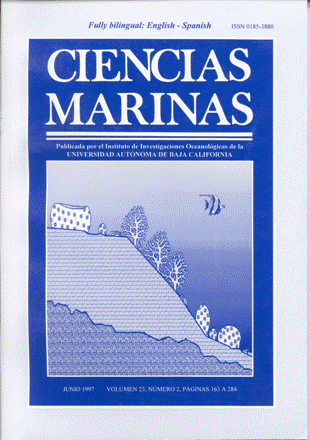Community structure and geographic distribution of the coral reefs of nayarit, mexican pacific
Main Article Content
Abstract
Aunque gran parte de los arrecifes y comunidades coralinas del Pacífico oriental han sido bien estudiados, aún existe un notable desconocimiento sobre la ocurrencia, distribución y composición faunística de aquellos que se encuentran en la costa occidental de México. Aunado al problema anterior, el margen costero de esta región está siendo objeto de grandes modificaciones antropogénicas que pueden afectar de manera irreversible a las comunidades coralinas locales. El presente trabajo tiene como objetivo el de describir la estructura y distribución de los principales arrecifes y comunidades coralinas de la región costera en el estado de Nayarit (20-21ºN). Los resultados del estudio indican que estas zonas presentan una alta riqueza específica y una zonación clara, pero baja diversidad y uniformidad, principalmente debido a la dominancia de Pocillopora damicornis (L.) en las localidades. Debido a los efectos conjuntos de la pequeña área de plataforma continental colonizable por corales, la relativamente baja transparencia del agua y la presencia de una termoclina muy somera, todos los arrecifes observados en el sur de Nayarit son angostos, del tipo de franja. Las barreras fisiográficas e hidrológicas en la región, como las desembocaduras de ríos y amplias marismas al norte, y el efecto de las surgencias al sur, dan lugar a una distribución disjunta de las zonas de desarrollo arrecifal en la costa de Nayarit, limitándose a una sección de costa rocosa de unos 130 km de longitud.
Although most of the reefs and coral communities of the eastern Pacific have been well studied, there is still great ignorance regarding the occurrence, distribution and faunistic composition of those on the western coast of Mexico. Moreover, the coastal margin of this region is being subjected to great anthropogenic modifications that may irreversibly affect the local coral communities. The present study has the objective of describing the structure and distribution of the main coral reefs and coral communities in the coastal region of the state of Nayarit (20-21ºN). The results indicate that these zones are characterized by a high specific richness and a clear zonation, but with low diversity and uniformity, principally due to the dominance of Pocillopora damicornis (L.) in these localities. Because of the combined effects of the small continental shelf area that can be colonized by corals, the relatively low water transparency and the presence of a very shallow thermocline, all the coral reefs observed in southern Nayarit are narrow fringing reefs. The physiographic and hydrologic barriers in the region, such as river mouths and ample marsh areas to the north, and upwelling effects in the South, give place to a disjunct distribution of the zones of coral reef development on the Nayarit coast, limiting their distribution to a rocky coastal section of about 130 km in length.
Although most of the reefs and coral communities of the eastern Pacific have been well studied, there is still great ignorance regarding the occurrence, distribution and faunistic composition of those on the western coast of Mexico. Moreover, the coastal margin of this region is being subjected to great anthropogenic modifications that may irreversibly affect the local coral communities. The present study has the objective of describing the structure and distribution of the main coral reefs and coral communities in the coastal region of the state of Nayarit (20-21ºN). The results indicate that these zones are characterized by a high specific richness and a clear zonation, but with low diversity and uniformity, principally due to the dominance of Pocillopora damicornis (L.) in these localities. Because of the combined effects of the small continental shelf area that can be colonized by corals, the relatively low water transparency and the presence of a very shallow thermocline, all the coral reefs observed in southern Nayarit are narrow fringing reefs. The physiographic and hydrologic barriers in the region, such as river mouths and ample marsh areas to the north, and upwelling effects in the South, give place to a disjunct distribution of the zones of coral reef development on the Nayarit coast, limiting their distribution to a rocky coastal section of about 130 km in length.
Downloads
Download data is not yet available.
Article Details
How to Cite
Carriquiry, J., & Reyes-Bonilla, H. (1997). Community structure and geographic distribution of the coral reefs of nayarit, mexican pacific. Ciencias Marinas, 23(2), 77–96. https://doi.org/10.7773/cm.v23i2.793
Issue
Section
Research Article
This is an open access article distributed under a Creative Commons Attribution 4.0 License, which allows you to share and adapt the work, as long as you give appropriate credit to the original author(s) and the source, provide a link to the Creative Commons license, and indicate if changes were made. Figures, tables and other elements in the article are included in the article’s CC BY 4.0 license, unless otherwise indicated. The journal title is protected by copyrights and not subject to this license. Full license deed can be viewed here.

